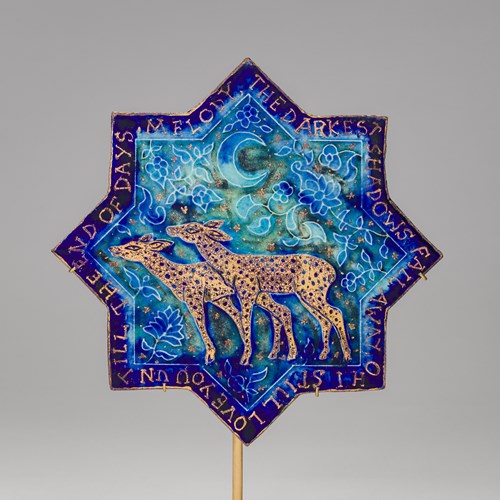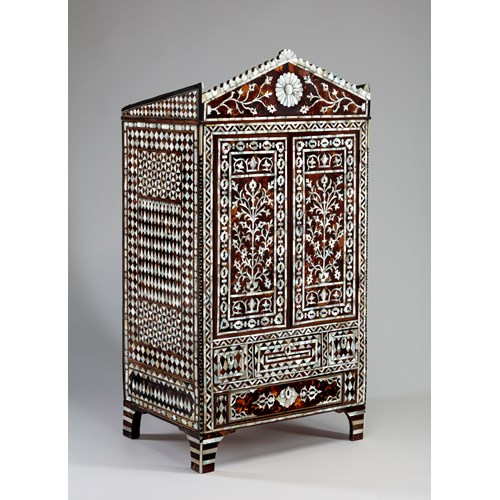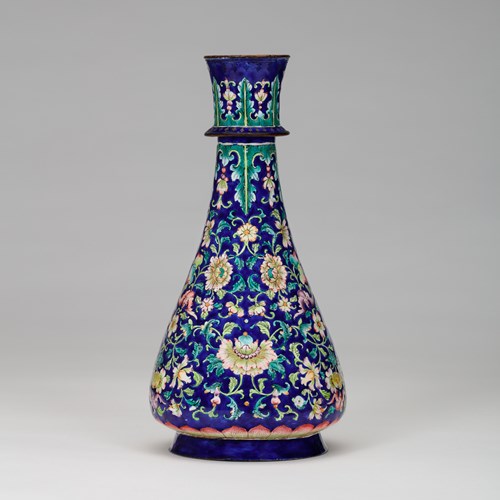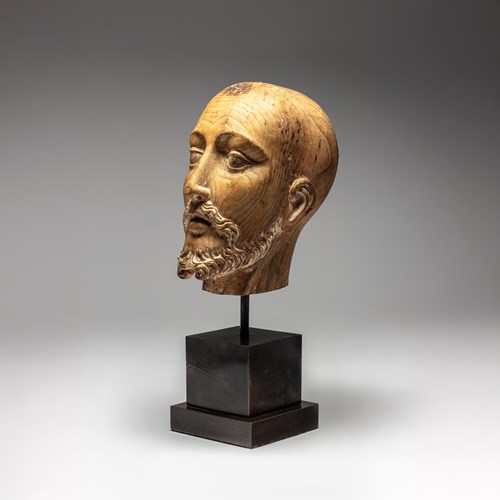Marketplace
Qajar Charger
Qajar Charger
Date 19th century
Period 19th century, Mid-19th century
Origin Iran
Medium Ceramics and Glass
Dimension 7 x 38 cm (2³/₄ x 15 inches)
This elaborately designed charger of deep form on a short-rounded foot depicts at its centre a skilfully composed design of a young couple dressed in richly patterned clothes and elegant headwear reflecting the luxury life of the Qajar court. The male offers his lover a glass of wine, a favoured metaphor for earthly and divine love in Persian literature. Pomegranates and sherbets fill the central foreground while curtain drapes above the couple indicate a private meeting ground. Surrounding the central scene are intertwined floral motifs painted in blue, yellow, white, green and brown, all outlined in black, whilst the rim is outlined in brown.
There is an inscription on the back of the dish with the maker’s mark which reads amal-e Husayn (“made by Husayn”). Although very little is known about this skilled painter,[1] his distinctive signature is easily recognisable on Qajar ceramics; for example, there are several pieces painted by Husayn in the Islamic Arts Museum Malaysia, including several charges (Museum Numbers: IAMM 2016.13.21 and IAMM 2016.13.15) and a qalyan / waterpipe (Museum Number: IAMM 2016.13.49). The Victoria and Albert Museum in London also has several pieces from the late Qajar period signed by Husayn, including a vase (Museum Number: 579-1888); a flask (Museum Number: 516-1888) and a bottle (Museum number: 574-1888).
References
[1] See, Heba Nayel Barakat and Zahra Khademi. 2019. Qajar Ceramics: Bridging Tradition and Modernity, edited by Lucien de Guise. Islamic Arts Museum Malaysia. p.213.
There is an inscription on the back of the dish with the maker’s mark which reads amal-e Husayn (“made by Husayn”). Although very little is known about this skilled painter,[1] his distinctive signature is easily recognisable on Qajar ceramics; for example, there are several pieces painted by Husayn in the Islamic Arts Museum Malaysia, including several charges (Museum Numbers: IAMM 2016.13.21 and IAMM 2016.13.15) and a qalyan / waterpipe (Museum Number: IAMM 2016.13.49). The Victoria and Albert Museum in London also has several pieces from the late Qajar period signed by Husayn, including a vase (Museum Number: 579-1888); a flask (Museum Number: 516-1888) and a bottle (Museum number: 574-1888).
References
[1] See, Heba Nayel Barakat and Zahra Khademi. 2019. Qajar Ceramics: Bridging Tradition and Modernity, edited by Lucien de Guise. Islamic Arts Museum Malaysia. p.213.
Date: 19th century
Period: 19th century, Mid-19th century
Origin: Iran
Medium: Ceramics and Glass
Dimension: 7 x 38 cm (2³/₄ x 15 inches)
More artworks from the Gallery









